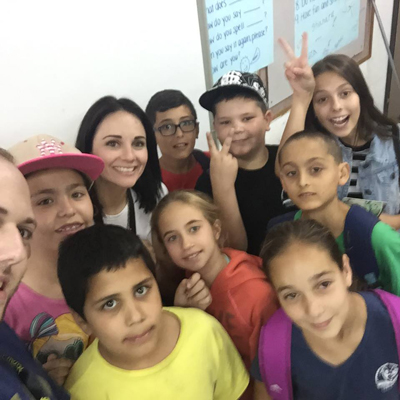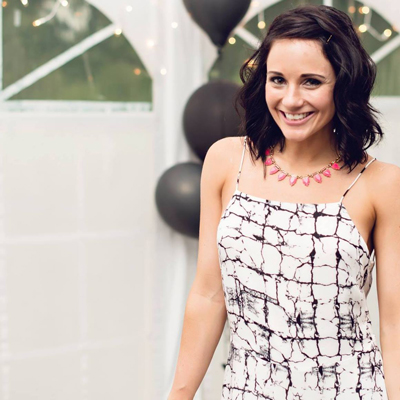My Crazy, Beautiful Israeli Classroom
Permanent link All Posts
As I reflect on my TALMA experience, I feel as if an overwhelming amount of change and growth has taken place. There are the superficial, surface changes like living in a different country for a month, getting slightly tanner, gaining new friends and eating large amounts of hummus and pita for four consecutive weeks, but really, it goes beyond that.
There has been such a shift in my perspective. The lenses through which I view both education and "real life" are exponentially different than they were at the end of June.
The TALMA program brings instructional leaders from around the world to teach English to students in low-income communities on the Israeli periphery through an immersion-centered learning environment. And as anyone would guess, Israeli culture inside (and outside) the classroom is quite different.
There are a unique set of challenges accompanied by many successes. It was not, for example, uncommon for my small class of nine students to have multiple screaming matches (with my co-teacher and I as well as each other), kicking wars and crying fits. The door was slammed multiple times per day and silence was quite the rarity -- even when one of us was talking. Describe this situation to me before all this happened and I would have been extremely scared. I would have shaken my head in disbelief, smiling a doubtful smile.
But this is the reality. The students are genuinely sweet. They are real and authentic. They are loud, outspoken, and stand up for what they believe in. Their energy and behavior are like nothing I've ever experienced in a classroom. And you know what's strange? I absolutely loved all of this.
I lived for each day inside the classroom. I lived for each challenging moment in which I had no idea what I was supposed to do; for the times that it was absolutely essential that I rely on my patient co-teacher for his ability to speak their language; for the times that I thought to myself about how behaviors like this were not common in our schools; for the moments when I felt completely powerless and didn't know what to do.
The beauty is that each time I found myself in a difficult situation, I did something. I am, in fact, not powerless. I was forced to expand my knowledge, reach for tools I've never used, and rely on help from others to turn a challenging situation into a unique learning experience.
The first day, I was panicking about something. Sahar (my co-teacher, who has become like family) looked at me and said, "It's no problem." When I asked him how he could be so calm, he gave me the best advice I've heard in quite a while: "A problem is something big, like losing a child. Israel has bigger problems than the computer not turning on."
I took a step back and thought about every time I'm stressed about something at my job at home, or panicked about something in my real life. He's right. What seems like a problem actually isn't. It will be okay. Life is going to continue. The students spoke more and more English, and each day ended with a smile.
I'm not sure that describing the change in my perspective as just a shift is accurate, exactly. When I came into this program, I felt extremely nervous (shocker, right?). I did not trust that my teaching experience and education would be enough. While I have learned valuable lessons in best practices for teaching English learners each day, I've also learned that it is absolutely essential to believe in what I bring into the classroom. Each TALMA teacher (Israeli and American) has such a unique skill set that allows him or her to be successful. The proof is in the conversations I've had with others, pictures shared on Facebook and just the overall confidence in the group.
With that being said, one of the most important lessons I've learned is that it is 100 percent okay (and necessary) to ask for help and rely on others. I admit that I haven't always been the best at this both in the school setting and real life. But being in a loud classroom with children yelling a foreign language and looking at you with pure confusion on their sweet faces really is eye-opening. It is a "rip the Band-aid off" learning situation that makes you feel absolutely powerless in a humbling way.
Although I've known it all along, I now believe and live the idea that we cannot do all things alone. Each moment I relied on my amazing co-teacher and principal, students, friends and TALMA administrators. While that may have left me feeling inadequate in the past, I now feel fulfilled.
There has also been such a growth in my instructional strategies, especially with teaching English learners. I've realized the importance of movement breaks, games, gestures, pointing and relevant vocabulary. But the growth has come in my educational philosophy. I've always strived to incorporate authentic learning activities into the curriculum, but that abstract term is now more concrete. These activities do not only have to be learning vocabulary, spelling words or reading.
The times in which I've seen the biggest change in my students is when we've done an activity to build their confidence; the moments when we play at recess and converse in English; and when they get to teach me Hebrew. In the past, authentic still meant directly related to the learning goals, being able to be measured by standards. Now I have seen the value of self-confidence and the socio-emotional aspect. It is such a powerful thing to be able to make a strong connection with children who understand very little of the language you speak.
Life is challenging, that's for sure, but by relying on others, taking each moment for what it is, leaving the past behind, smiling and believing in ourselves and in others -- we'll all make it through.

TALMA, a program sponsored by the Israeli Government, the Schusterman Family Foundation & the Steinhardt Foundation, seeks to enlist more than one hundred instructional leaders from around the world to educate, inspire and lead in an informal, experiential summer learning program for elementary school students in the Israeli periphery. TALMA educators will teach in an English immersion-centered learning environment for students who live in low-income communities. English proficiency is essential for future academic success and developing this skill is critical to unlocking future opportunities.
TALMA is YOUR opportunity to use your summer to grow your leadership network, gain international education experience and have an immersive personal & professional development journey in Israel grounded in an effort to repair the world. The first two summers were an amazing success, and now we want to expand this groundbreaking program and increase our impact with the contributions of MORE highly qualified leaders like you to spearhead the effort.
Still have Questions? Contact us at talma.admissions@gmail.com.



.jpg)



